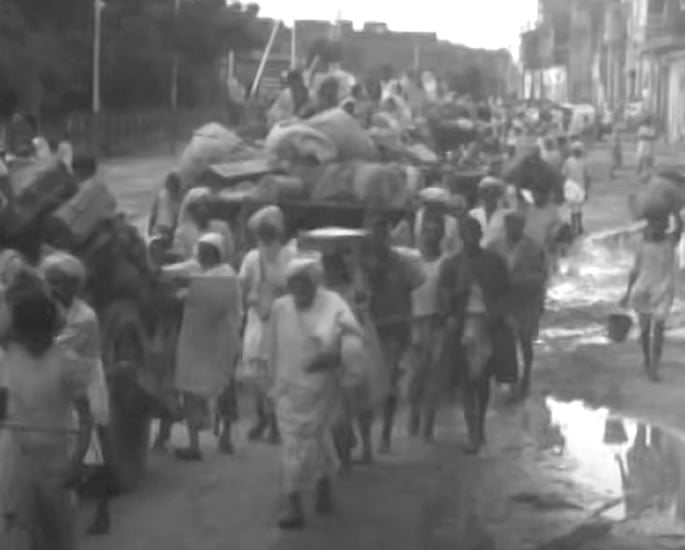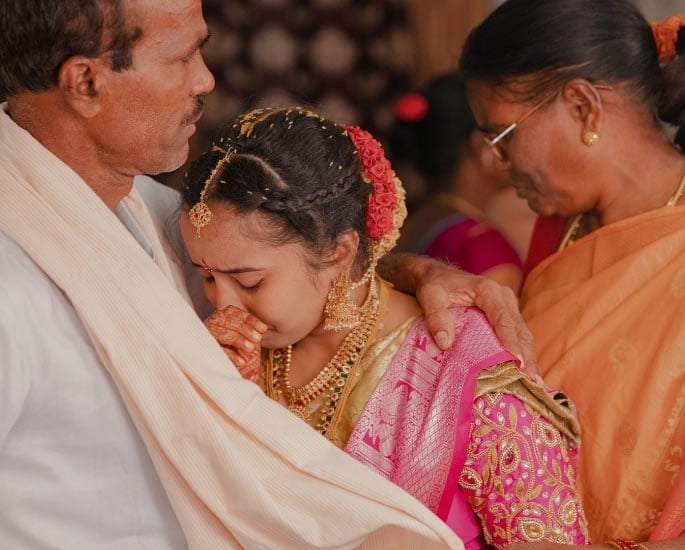"She’s got Indian heritage. I’ve got Pakistani heritage."
Netflix’s Love is Blind UK has done more than just be a dating show; it has become a space for confronting deeply ingrained societal norms.
As a new batch of British singles embarked on a quest for love, sight unseen, the journey of two contestants, Kal and Sarover, brought a rarely discussed dating taboo into the mainstream spotlight.
The instant connection formed between Kal, who is half-Pakistani, and 29-year-old Sarover, who is British Punjabi, was undeniable.
However, their budding romance soon encountered a hurdle rooted in decades of political history and cultural division.
This single revelation unearthed a complex and painful past, forcing the couple, and British South Asian viewers, to confront a difficult question: can love truly bridge a divide that has separated nations and communities for over 78 years?
Bringing a Hidden Issue to Light

In the sequestered environment of the Love is Blind pods, emotional intimacy is the only currency.
Kal and Sarover’s connection was a textbook example of the show’s premise working to perfection.
They moved past superficialities, discussing their career ambitions, hopes for the future, and even family traumas, building a foundation of vulnerability and trust that often takes months, if not years, to establish in the outside world.
But it was after the revelation of their respective heritages that their modern love story collided with history.
They immediately joked about the monumental task they faced, wondering if they could “bridge the gap” and “solve history”.
While said in jest, the comments held a profound weight. The show gave this tension the space it deserved, allowing Kal to articulate the challenge in a poignant voiceover:
“I’ve come here to find love, definitely, and I wouldn’t have expected to find it in Sarover.
“She’s got Indian heritage. I’ve got Pakistani heritage.
“Historically, there’s been conflict and a massive divide between India and Pakistan. Ten, 15 years ago, me and her probably wouldn’t even be having a conversation.
“Especially for the older generation, I know from experience, a parent with an Indian daughter would not want them dating a half-Pakistani or Pakistani guy. They just did not get on.”
For many in the community, hearing this on one of the most popular dating shows in the world was a revolutionary act of validation.
It was heartening to see someone so perfectly summarise a crisis that has quietly shaped and, in some cases, ruined lives for decades.
The Scars of Partition

To understand Kal and Sarover’s initial apprehension, one must look back to 1947.
The end of British colonial rule resulted in the Partition of India, a violent and chaotic event that ripped the subcontinent apart along religious lines, creating the new nation of Pakistan.
Communities of Hindus, Sikhs, and Muslims that had lived alongside each other for centuries were violently fractured.
Between 12 and 20 million people were displaced in one of the largest mass migrations in human history, forced to ‘choose’ a side. The ensuing riots, massacres, and sexual assaults left an indelible scar, with estimates of the dead ranging from several hundred thousand to two million.
These are not abstract historical events; they are lived traumas passed down through generations.
For many families in the diaspora, the wounds of Partition are still fresh. Stories of survival, loss, and betrayal have become part of their heritage.
This volatile political divide continues to permeate today, impacting millions across the world.
The ongoing dispute over the territory of Kashmir has led to multiple wars and brought the nuclear-armed neighbours to the brink of conflict as recently as 2025.
This persistent political friction, whipped up by nationalist rhetoric and online misinformation, ensures that the ‘us versus them’ mentality remains deeply embedded in the collective consciousness of both communities.
Family, Honour & Community Pressure

For couples from Indian and Pakistani backgrounds, the challenges often have less to do with their personal feelings and more to do with navigating the complex web of family, community, and cultural expectations.
As Dr Belynder Walia, founder of Serene Lifestyles, explains:
“The India-Pakistan dynamic adds deep layers of complexity.
“For some, this is a perceived declaration of loyalty as well as a love story because of religious and historical tensions.
“These dynamics are frequently caused by identity preservation, generational wounds and deeply embedded cultural narratives, which focus on what the participants represent to their communities rather than just the individuals themselves.”
This pressure to uphold family ‘honour’ often falls disproportionately on women.
Dr Walia notes that “women’s decisions are still influenced by family ‘honour’ in many traditions, whereas men are given more social freedom”.
This was a burden Sarover acknowledged on Love is Blind UK, admitting she had only ever dated Indian boys, feeling a lot of pressure to make her family “proud”.
The fear of rejection, gossip, or even being ostracised is a powerful deterrent from embarking on such relationships.
Navigating Guilt, Identity & Self-Doubt

The external pressures from family and community inevitably create a powerful internal conflict. Individuals can find themselves in a painful tug of war between their heart, their heritage, and their sense of duty.
As psychotherapist and founder of Care2Counsel, Tina Chummun, states:
“You’re dealing with accusations of disloyalty and dishonour, as shaped by deeply rooted generational narratives of partition, colonialism and communal trauma.”
This makes the situation feel incredibly delicate and, for many, harder to navigate than outright racism from outside the community.
It’s a conflict between two cultures that share so much, food, language, music, and traditions, yet are kept apart by a historical chasm.
This internal battle can lead to feelings of loneliness, isolation, and even selfishness.
Sonal Dave, a celebrant who appeared in the last series of Love is Blind UK, highlights how crucial family approval is within South Asian culture, suggesting it often stands in for other expressions of love.
She said:
“When a family embraces our choice of partner, it strengthens our sense of making a ‘right’ choice.”
“If they are critical and disapproving, it can make us doubt ourselves, even if the relationship is healthy and fulfilling.”
This self-doubt can be crippling, forcing individuals to choose between their own happiness and the harmony of their entire family, a choice no one should have to make.
A New Generation’s Approach to Love

Despite the formidable obstacles, the conversation between Kal and Sarover also signalled a profound sense of hope.
Sarover’s response to Kal’s concerns was a testament to a generational shift in attitudes.
She told him: “Undoing so many years of upbringing, it took a long time.
“Over the years, even my grandparents are so open and we have so many mixed marriages in the family now.”
Her words reflect a growing sentiment among younger British Asians who are seeking to define their identities on their own terms, moving beyond the historical grievances of their elders.
For those navigating this difficult path, experts suggest the only way forward is through open and empathetic communication.
Sonal Dave advises that the first step is to understand where the family’s fears are coming from:
“Our elders grew up in a different time, where history, duty, religion, tradition and stability were their only choices.
“Younger generations have the opportunity to value love and companionship.”
Approaching the conversation with this context can help build a bridge of understanding.
The key is to remain calm, allow family members to feel heard, and clearly articulate that the decision is ultimately a personal one. It’s also crucial to be patient, as acceptance may not happen overnight.
The open dialogue between Kal and Sarover serves as a powerful on-screen example of how to have these conversations with mutual respect and understanding.
Kal and Sarover’s relationship received the blessing of the latter’s mother and the couple went on to say “I Do” at the altar, but the wider impact of their journey cannot be overstated.
By bringing this decades-old taboo into millions of living rooms, the show kickstarted a vital conversation.
It provided a language and a platform for an issue that has been a source of silent struggle for countless couples within the South Asian diaspora.
For the many young British Asians in similar relationships, or for those who have avoided them out of fear, seeing this dynamic explored with such nuance and sensitivity is a monumental step forward.
It reinforces the idea that love can, and should, be a personal choice, free from the weight of historical conflict.
Ultimately, the lesson from Love is Blind UK is a powerful one: love might be blind, but building a lasting marriage requires entering it with eyes wide open to the challenges of the world, ready to face them together.






























































